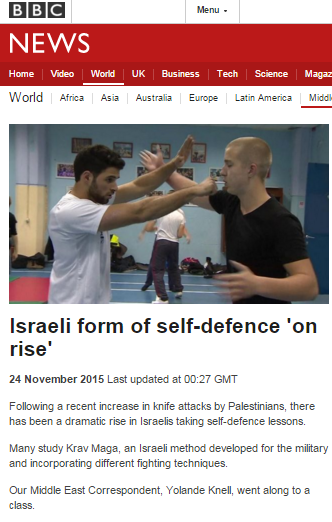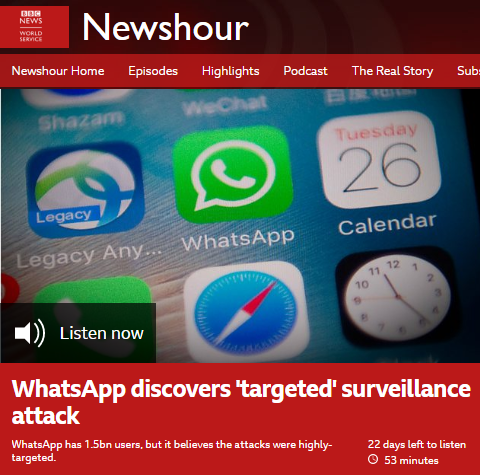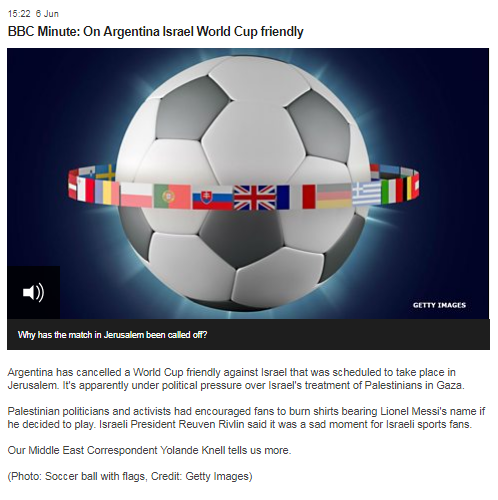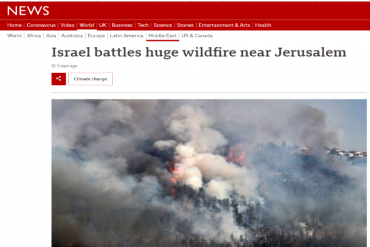In addition to the audio report produced by Jeremy Bowen on his recent visit to Jerusalem, a written report appeared on the BBC News website’s Middle East page on May 4th under the headline “Israel-Palestinian tensions return to boiling point“.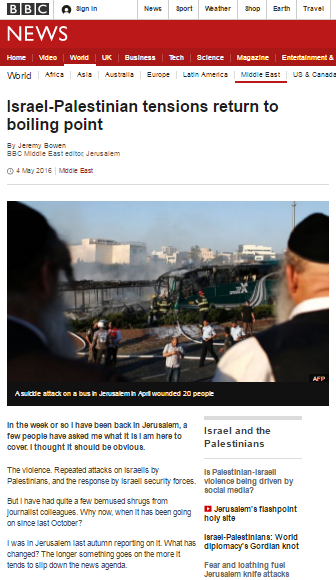
The surge in terror attacks which began last September has of course subsided somewhat in recent months but Jeremy Bowen has not travelled all the way to Jerusalem to tell his audiences that.
“In the week or so I have been back in Jerusalem, a few people have asked me what it is I am here to cover. I thought it should be obvious.
The violence. Repeated attacks on Israelis by Palestinians, and the response by Israeli security forces.
But I have had quite a few bemused shrugs from journalist colleagues. Why now, when it has been going on since last October?
I was in Jerusalem last autumn reporting on it. What has changed? The longer something goes on the more it tends to slip down the news agenda.”
As regular readers will be aware, the BBC’s coverage of that “news agenda” during the first six months of the wave of terror hovered at around five and a half percent.
Neither has Bowen flown all the way to Jerusalem to enhance his audiences’ knowledge on the issue of Palestinian terrorism – as demonstrated by the fact that he manages to describe last month’s bus bombing in the Israeli capital without using the word ‘terror’ even once.
“Eden Dadon, a 15-year-old Israeli girl, is in hospital in Jerusalem with 45% burns that she suffered when a Palestinian set off a bomb on a bus on 18 April.
When I met her mother, Rachel, at the hospital, Eden had been on a ventilator in an induced coma for more than a month [sic]. […]
A bomb on a bus revived horrible memories for Israelis of the attacks that killed hundreds of people during the second intifada (Palestinian uprising) in the years after 2000.
Rachel, who was scared before the bus she and her daughter boarded blew up, is a single mother. She has had to stop working as a carer for old people so she can spend time with her daughter.”
What Bowen has come to do is to continue his promotion of a sense of equivalence between the victims of terror attacks and their perpetrators – and so readers find an interview with the bus bombing terrorist’s mother which is almost as long as the one with the mother and sister of the Israeli victim suffering from severe burns. As has so often been the case in the past, Bowen refrains from mentioning Hamas’ designation as a terrorist organization.
“Abdul’s attack, though, was claimed by Hamas, the Islamic Resistance Movement.”
He promotes the euphemism ‘resistance’ and provides readers with ‘explanations’ for the attempted murder of a bus load of civilians.
“Not just Abed [Abdul], I think all the people here now prefer the resistance. Because for them peace is a hopeless case.”
“He was angry for everything that happened in Palestine. He was watching what happened everyday. Killings, arrests, destroying homes, everything. Of course he was angry.”
Bowen later adds more amplification of Palestinian propaganda in his own words:
“Palestinians hate the occupation and loathe what they say is Israel’s trigger-happy response to threats, often complaining that they are scared to reach into their pockets or bags near Israelis soldiers and police officers in case they get shot dead.”
Bowen has also travelled all the way to Jerusalem to continue what he and his colleagues have been doing for the last seven months: avoiding informing their audiences in their own words about the incitement coming from official Palestinian sources which fueled the wave of terror.
“The Israeli prime minister’s spokesman told me that “teaching Palestinian children to hate is one of the primary causes of the terror attacks against Israeli civilians today… their impressionable minds should not be poisoned with hatred by the Palestinian Authority.””
Moreover, Bowen uses the ‘smoke and mirrors’ trick of creating an irrelevant comparison – and false equivalence – between incitement and glorification of terrorism sanctioned and organized by the Palestinian Authority and its main party Fatah with the behaviour of a specific group of Israeli football hooligans.
“Hate-filled Palestinian rhetoric against Israel is not hard to find. It cuts the other way too.
Fans of one of Jerusalem’s professional football clubs, which has roots in a right-wing Zionist youth movement, are notorious for chanting “Death to Arabs” during games.”
But what Bowen has primarily come to do in Jerusalem is some maintenance on his long-standing project of deflecting attention away from Palestinian incitement (in accordance with PLO guidance) and encouraging audiences to adopt the view that the acts of terror perpetrated by Palestinians should be attributed to one cause alone.
“But hundreds of conversations with Palestinians over many years here have convinced me that the biggest factor that shapes their attitudes to Israel is not the incitement to hate but the occupation of the Palestinian territories, including East Jerusalem, that started after Israel’s victory in the 1967 Middle East war.
When Palestinians who agitate against Israel find an audience, it is because of the way that the occupation, which is inherently violent, has overshadowed and controlled Palestinian lives for almost 50 years.”
As ever, Bowen fails to provide audiences with the relevant context concerning the background to the Six Day War and conscientiously avoids giving them any information concerning the legal status of Judea and Samaria before they were belligerently occupied by Jordan in 1948. For Bowen – and, he hopes, his audiences – all that is relevant is ‘the Israeli occupation’ because that is what enables his ensuing framing of the conflict.
“The issues here do not change much. Two peoples have been fighting for generations about one piece of land. That is still the core of the conflict.”
For over seven months the BBC – with Jeremy Bowen at the helm of its Middle East reporting – has avoided carrying out any serious reporting on the issue of official Palestinian incitement and glorification of terrorism. When Bowen’s post was created over a decade ago it was described as being intended “to take a bird’s eye view of developments in the Middle East, providing analysis that might make a complex story more comprehensive or comprehensible for the audience, without the constraints of acting as a daily news correspondent.”
BBC audiences are not getting that analysis because Bowen’s main priority is not audience comprehension but the promotion of specific framing of the story which serves a politically driven agenda.
Related Articles:
BBC’s ME Editor gives unchallenged amplification to Palestinian defamation
BBC News reports Jerusalem bus bomb without using the word terror
BBC News changes headline on Hamas bus bomber claim
BBC’s ME editor fails to deliver in ‘Newsnight’ item on Jerusalem terror attacks
Explaining away terror BBC Bowen style – part one
Explaining away terror BBC Bowen style – part two

